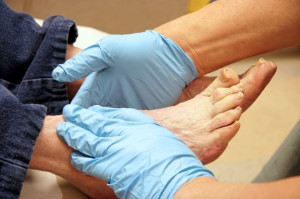Diabetes and Foot Wound Healing
Tuesday, 09 July 2024 00:00 Diabetes significantly impacts wound healing, particularly in the feet, due to high blood sugar levels that impair circulation and immune response. Diabetes is a chronic condition where the body cannot regulate blood sugar properly, leading to various complications. In diabetics, poor blood circulation reduces the delivery of oxygen and nutrients essential for healing, while neuropathy, or nerve damage, diminishes the sensation, making it harder to notice injuries. As a result, even minor foot wounds can progress to serious ulcers or infections if left untreated. Foot wounds in diabetic patients often occur due to friction, pressure, or minor trauma, exacerbated by poorly fitting shoes or neglect. To prevent and treat these wounds, maintain proper foot hygiene, inspect feet daily for injuries, and manage blood sugar levels rigorously. Wearing well-fitted shoes and avoiding walking barefoot can also help prevent injuries. If you have diabetes and have persistent wounds or complications, it is strongly suggested that you consult a podiatrist. These healthcare providers specialize in diabetic foot care, providing tailored treatment and preventing severe outcomes.
Diabetes significantly impacts wound healing, particularly in the feet, due to high blood sugar levels that impair circulation and immune response. Diabetes is a chronic condition where the body cannot regulate blood sugar properly, leading to various complications. In diabetics, poor blood circulation reduces the delivery of oxygen and nutrients essential for healing, while neuropathy, or nerve damage, diminishes the sensation, making it harder to notice injuries. As a result, even minor foot wounds can progress to serious ulcers or infections if left untreated. Foot wounds in diabetic patients often occur due to friction, pressure, or minor trauma, exacerbated by poorly fitting shoes or neglect. To prevent and treat these wounds, maintain proper foot hygiene, inspect feet daily for injuries, and manage blood sugar levels rigorously. Wearing well-fitted shoes and avoiding walking barefoot can also help prevent injuries. If you have diabetes and have persistent wounds or complications, it is strongly suggested that you consult a podiatrist. These healthcare providers specialize in diabetic foot care, providing tailored treatment and preventing severe outcomes.
Diabetic foot care is important in preventing foot ailments such as ulcers. If you are suffering from diabetes or have any other concerns about your feet, contact Dr. Scott Shrem from Garden State Foot & Ankle Center. Our doctor can provide the care you need to keep you pain-free and on your feet.
Diabetic Foot Care
Diabetes affects millions of people every year. The condition can damage blood vessels in many parts of the body, especially the feet. Because of this, taking care of your feet is essential if you have diabetes, and having a podiatrist help monitor your foot health is highly recommended.
The Importance of Caring for Your Feet
- Routinely inspect your feet for bruises or sores.
- Wear socks that fit your feet comfortably.
- Wear comfortable shoes that provide adequate support.
Patients with diabetes should have their doctor monitor their blood levels, as blood sugar levels play such a huge role in diabetic care. Monitoring these levels on a regular basis is highly advised.
It is always best to inform your healthcare professional of any concerns you may have regarding your feet, especially for diabetic patients. Early treatment and routine foot examinations are keys to maintaining proper health, especially because severe complications can arise if proper treatment is not applied.
If you have any questions please feel free to contact our office located in Hazlet, NJ . We offer the newest diagnostic and treatment technologies for all your foot and ankle needs.
Blog Archives
- April 2025
- March 2025
- February 2025
- January 2025
- December 2024
- November 2024
- October 2024
- September 2024
- August 2024
- July 2024
- June 2024
- May 2024
- April 2024
- March 2024
- February 2024
- January 2024
- December 2023
- November 2023
- October 2023
- September 2023
- August 2023
- July 2023
- June 2023
- May 2023
- April 2023
- March 2023
- February 2023
- January 2023
- December 2022
- November 2022
- October 2022
- September 2022
- August 2022
- July 2022
- June 2022
- May 2022
- April 2022
- March 2022
- February 2022
- January 2022
- December 2021
- November 2021
- October 2021
- September 2021
- August 2021
- July 2021
- June 2021
- May 2021
- April 2021
- March 2021
- February 2021
- January 2021
- December 2020
- November 2020
- October 2020
- September 2020
- August 2020
- July 2020
- June 2020
- May 2020
- April 2020
- March 2020
- February 2020
- January 2020
- December 2019
- November 2019
- October 2019
- September 2019
- August 2019
- July 2019
- June 2019
- May 2019
- April 2019
- March 2019
- February 2019
- January 2019
- December 2018
- November 2018
- October 2018
- September 2018
- August 2018
- July 2018
- June 2018
- May 2018
- April 2018
- March 2018








